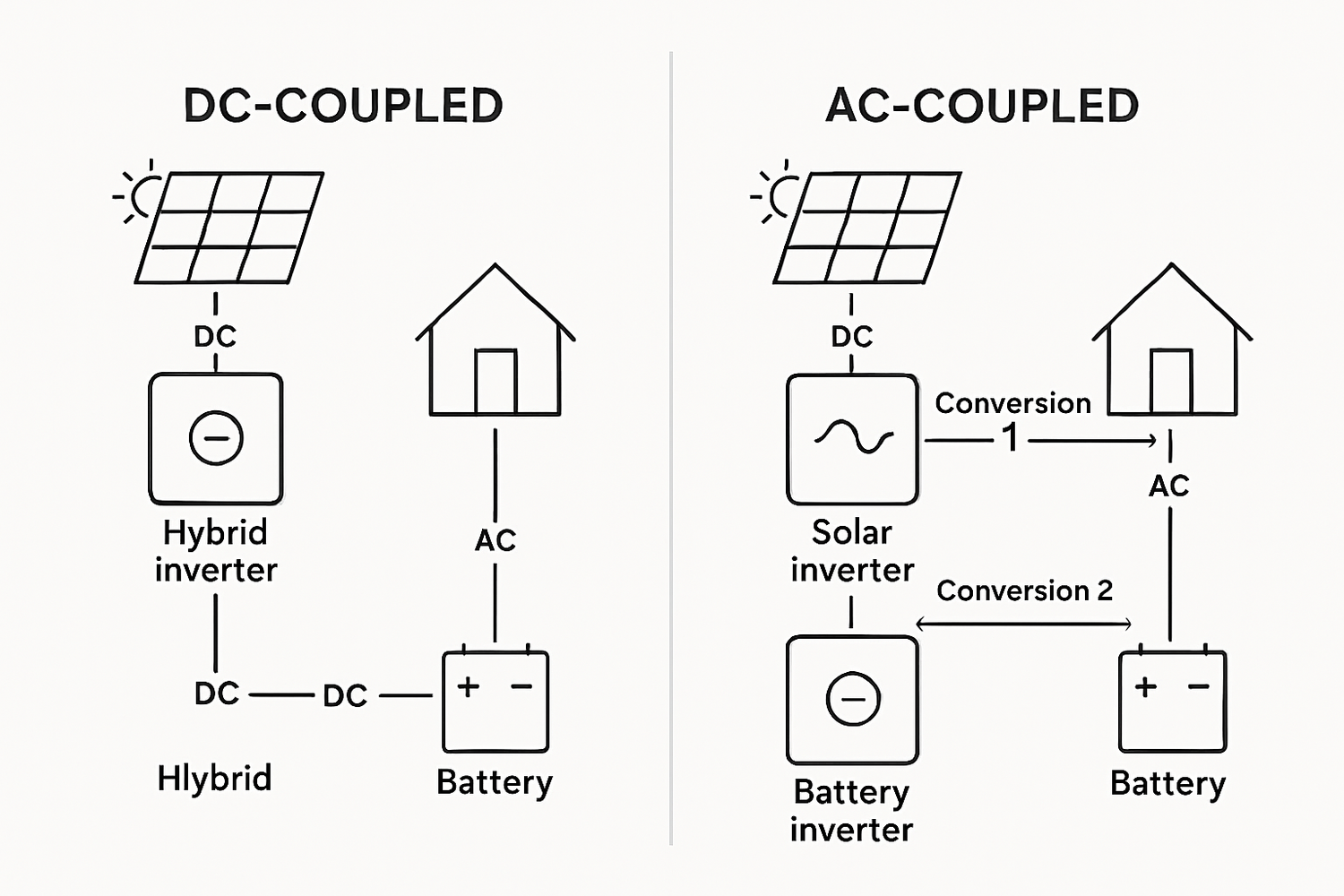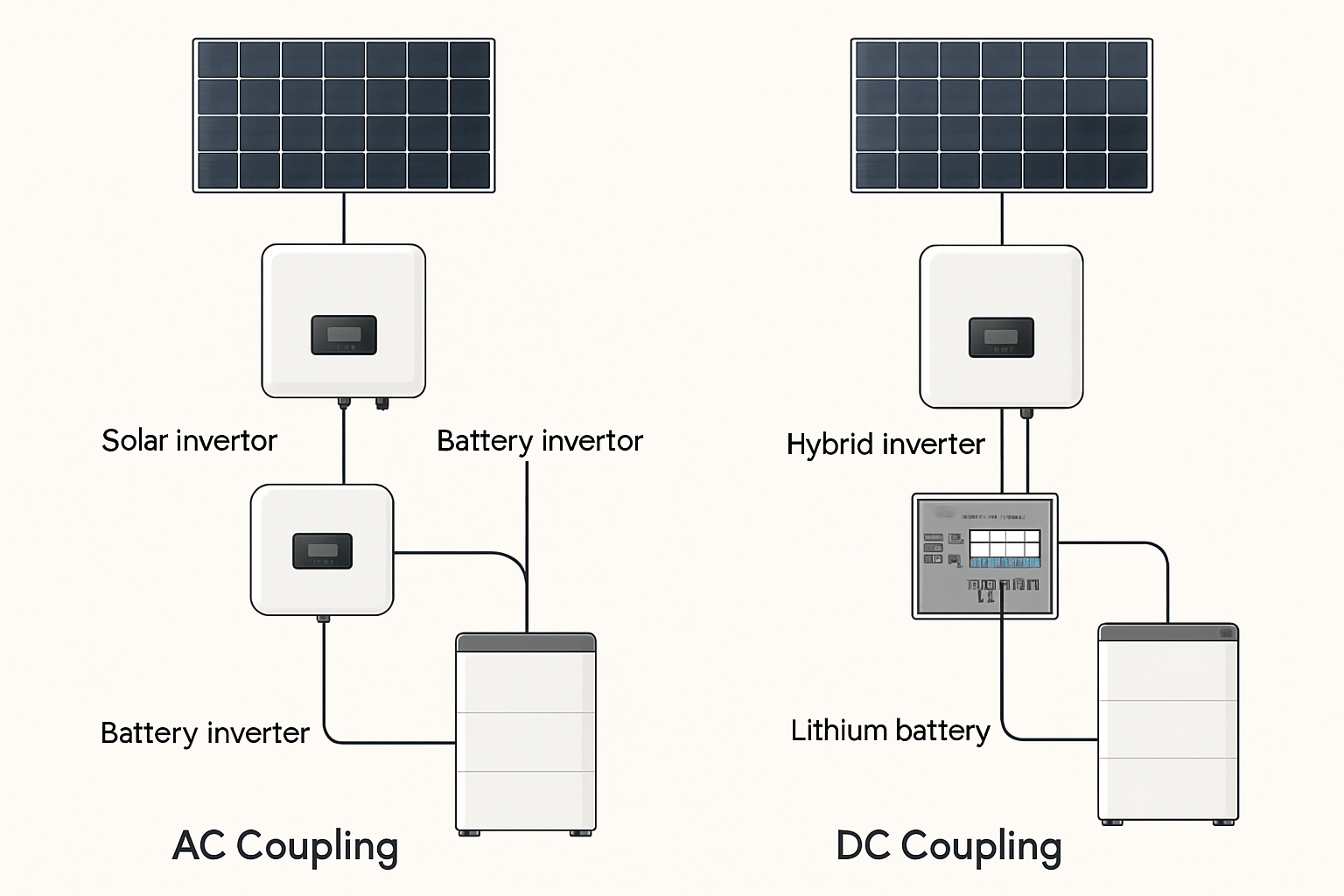Maximizing the energy harvested from your solar panels is the primary goal of any home battery storage system. The architecture of your system plays a pivotal role in achieving this, directly impacting how much stored energy is available for your home. A DC-Coupled LiFePO4 battery system offers a highly effective design to achieve peak efficiency energy storage. This approach minimizes energy loss, enhances reliability, and leverages the most stable battery chemistry available today, providing a robust path toward energy independence.
Understanding System Architecture: AC vs. DC Coupling
The way your solar panels, inverter, and battery are connected determines your system’s overall effectiveness. The two primary architectures are DC-coupled and AC-coupled, and the main difference lies in how many times energy is converted between Direct Current (DC) and Alternating Current (AC).
What is DC Coupling?
In a DC-coupled configuration, the DC power generated by your solar panels flows through a charge controller directly to your battery bank. The energy is stored as DC power. When your home needs power, a single hybrid inverter then converts the stored DC electricity into AC electricity to power your appliances. This creates a direct and efficient path from generation to storage.
How Does AC Coupling Differ?
In an AC-coupled system, the DC power from the solar panels is first converted to AC power by a solar inverter. This AC power is used by the home, and any excess is sent to a separate battery inverter. This second inverter converts the AC power back to DC to charge the battery. When the stored power is needed, it is converted from DC back to AC again. This process involves multiple energy conversions.
The Critical Role of Conversion Efficiency
Every time electricity is converted from DC to AC or vice versa, a small amount of energy is lost, primarily as heat. An AC-coupled system can involve up to three separate conversions before the stored energy is used by an appliance. A DC-coupled system, however, only requires one conversion to power your home from the battery. By reducing the number of conversion steps, a DC-coupled architecture inherently conserves more energy.
The Efficiency Advantage of DC-Coupled Systems
The primary benefit of a DC-coupled design is its superior efficiency. By minimizing conversion losses, more of the sun’s energy is captured and stored, giving you more usable power and better long-term value.
Minimizing Conversion Losses for Higher Round-Trip Efficiency
Round-trip efficiency measures how much energy you get out of a battery compared to the amount put in. Because a DC-coupled system sends solar power directly to the battery without intermediate conversions, it achieves a higher round-trip efficiency. DC-coupled systems can reach efficiencies above 95%, while AC-coupled systems typically operate in the 90-94% range. This seemingly small difference adds up to significant energy savings over the life of the system. For a detailed analysis of performance metrics, the Ultimate Reference for Solar Storage Performance offers valuable insights into how efficiency impacts system design.
Enhanced Performance in Off-Grid and Backup Scenarios
For off-grid homes or those seeking reliable backup power, DC-coupled systems offer a distinct advantage. They possess 'black start' capability, meaning if the battery is completely drained, the system can restart using solar power alone. AC-coupled systems often rely on the grid to form a signal for the inverters to function, which can be a limitation during a prolonged outage. The simplicity and robustness of the DC-coupled design make it an exceptionally reliable choice when grid power is unavailable.
Why LiFePO4 is the Ideal Chemistry for DC Coupling
The battery is the heart of your storage system, and Lithium Iron Phosphate (LiFePO4) has emerged as the premier choice for residential applications due to its safety, longevity, and performance.
Superior Safety and Stability
LiFePO4 chemistry is inherently more stable than other lithium-ion variants. It has a higher thermal runaway threshold, making it far less prone to overheating. This stability, combined with a built-in Battery Management System (BMS) that protects against over-charging, over-current, and short-circuits, makes LiFePO4 batteries an extremely safe option for a home energy storage system.
Longevity and Deep Cycle Capabilities
LiFePO4 batteries are built to last, offering a significantly longer cycle life than traditional lead-acid batteries. They can typically endure 4,000 to 6,000 charge cycles while retaining a high percentage of their original capacity. Furthermore, they can be safely discharged to 80-90% of their capacity without significant degradation, whereas lead-acid batteries are often limited to a 50% depth of discharge (DoD) to preserve their lifespan. This means a LiFePO4 battery provides more usable energy from the same rated capacity.
| Feature | LiFePO4 Battery | Lead-Acid Battery |
|---|---|---|
| Cycle Life | 4,000 - 6,000+ cycles | 400 - 1,500 cycles |
| Recommended Depth of Discharge (DoD) | 80-90% | 50% |
| Round-Trip Efficiency | ~95% or more | ~80-85% |
| Lifespan | 10+ years | 3-5 years |
| Maintenance | None required | Regular fluid checks (flooded types) |
High Performance and Energy Density
LiFePO4 batteries offer a high energy density, meaning they can store more power in a smaller and lighter package compared to lead-acid batteries. They can also handle high charge and discharge rates, allowing them to power demanding appliances and recharge quickly from your solar array. This high-performance capability ensures your home has the power it needs, when it needs it.
A Forward-Looking Energy Solution
Choosing a DC-Coupled LiFePO4 battery system is an investment in efficiency and reliability. This architecture maximizes the energy you harvest and store by minimizing wasteful conversions. When paired with the safety and longevity of LiFePO4 chemistry, it creates a powerful home battery storage system designed for decades of dependable service. As organizations like the International Energy Agency (IEA) highlight, battery storage is critical for a secure energy future, and optimizing system design is key to realizing that potential. This setup empowers you to take control of your energy, reduce reliance on an unpredictable grid, and secure your home’s power supply for years to come.
Frequently Asked Questions
Can I add a DC-coupled battery to my existing grid-tied solar system?
Retrofitting a DC-coupled system into an existing solar installation can be complex. It typically requires replacing the existing solar inverter with a hybrid inverter that can manage both the solar panels and the battery. For existing systems, an AC-coupled battery is often a more straightforward addition, although it comes with the efficiency trade-offs discussed.
What is 'round-trip efficiency' and why is it important?
Round-trip efficiency is the percentage of energy you can retrieve from a battery compared to the amount of energy it took to store it. A higher number is better. For example, if you put 10 kWh of energy into a battery and can pull 9.5 kWh out, its round-trip efficiency is 95%. This is a critical metric because higher efficiency means less wasted energy and more stored power available for your home.
How does a DC-Coupled LiFePO4 battery system handle power outages?
A DC-coupled system is exceptionally well-suited for power outages. Because the solar panels can directly charge the battery without needing a grid signal, your system can continue to harvest solar energy and power your home even during a multi-day blackout. This 'black start' capability provides a high level of energy security.
Is a DC-coupled system more expensive?
Initially, a DC-coupled system can be more cost-effective for new installations because it requires only one hybrid inverter instead of separate solar and battery inverters. While LiFePO4 batteries have a higher upfront cost than lead-acid batteries, their vastly longer lifespan and higher performance result in a lower total cost of ownership over time.





Leave a comment
All comments are moderated before being published.
This site is protected by hCaptcha and the hCaptcha Privacy Policy and Terms of Service apply.